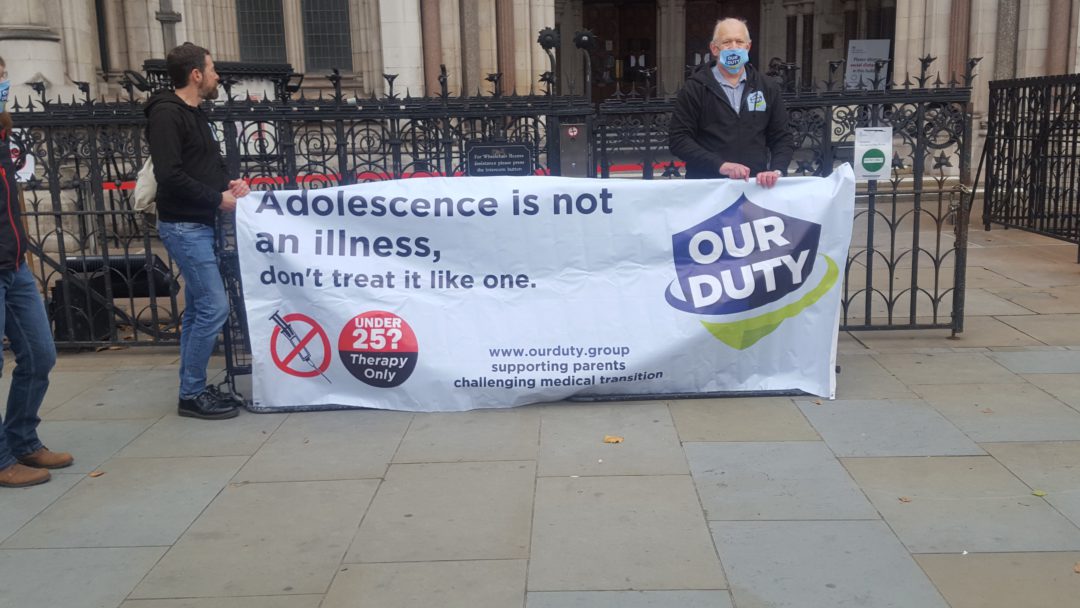Statements? More than one?
Since our first meeting on 5th December 2018, Our Duty has worked to hold The Tavistock and Portman NHS Foundation Trust to account. However, the efforts of Keira Bell and her legal team at Sinclairs Law have made a significantly greater contribution to advancing the welfare of gender dysphoric young people than our persistent and dogged questioning of The Tavistock board ever could. For that we are truly grateful, particularly to Keira for her courage and determination, she is an example to us all.
Following the handing down of the judgment at the high court (we gave our first impressions here) Keira gave an interview to the BBC:

https://www.bbc.co.uk/news/uk-england-cambridgeshire-55144148
Keira’s Statement is reproduced here:
I am delighted at the judgment of the court today.
It was a judgment that will protect vulnerable young people. I wish that it had been made for me before I embarked on the devastating experiment of puberty blockers. My life would be very different today. This time last year I joined this case with no hesitation, knowing what I knew about what had and has been going on at the gender identity clinic My hope was that outside of the noise of the culture wars the court would shine a light on this harmful experiment on vulnerable children and young people These drugs seriously harmed me in more ways than one and they have harmed many more particularly young girls and women.
This judgment is not political, it is about the protection of vulnerable children please read it carefully it exposes a complacent and dangerous culture at the heart of the national centre responsible for treating children and young people with gender dysphoria.
This fight is not yet over I would like to personally call on professionals and clinicians to create better mental health services and models to help those dealing with gender dysphoria to reconcile with their sex. And furthermore, I call on society to accept those who do not conform to sex stereotypes – not to push them into a life of drugs and concealment from who they truly are. This means stopping the homophobia, the misogyny and the bullying of those that are different.
Today I am delighted to see that common sense has prevailed and to see a reinstatement of safeguarding for children. I want to thank every single person who donated to make this case happen. Your generosity has helped protect vulnerable children and young people. I wish to thank Sue Evans who had the courage to begin this case. I also wish to thank my co-claimant Mrs A who has taken this case on behalf of the many parents who are agonising over the confusion their children are going through. Finally, I wish to thank the judges, my legal team, my partner, and all those before me who have worked to bring this issue to light. Thank You!
Keira Bell – Interview given to BBC News
First of all, we support Keira’s statement entirely. Her call to action, to professionals and clinicians to create better mental health services and models, is timely – we would only wish to amplify this message and add a sense of urgency. Her call to society to accept non-conforming people without labelling them as ‘transgender’ deserves the same amplification and sense of urgency.
We are heartened by the court’s judgement and Keira’s statement. While the majority of parents in Our Duty have children older than 16, and so more likely to be on cross-sex hormones than puberty blockers, the judgment represents a clear step towards common-sense and safeguarding.
The main outcome of this judgment is that gender clinics cannot put children under 16 on puberty blockers without permission from the court. This extra layer of gatekeeping will save children from unnecessary and harmful medical interventions. The majority of children with gender dysphoria desist when given time. ‘Watchful waiting’ combined with genuine psychotherapy works.
The nature of the judges’ decision is such that it calls into question other medical interventions – cross-sex hormones and surgeries – and creates an environment where clinicians must be certain that medical transition is in the child’s best interests. We struggle to see how it could be demonstrated that medical transition is ever in the child’s best interests, so we expect to see a significant reduction in cases of children put on the medical pathway.
We are pleased that the general considerations concerning informed consent and Gillick competence that we described in our article were considered by the court.
We made the point that the severity of the outcomes of the treatment necessitate a higher bar for competence to consent. The court agreed.
We made the point that the lack of evidence of positive outcomes necessitated a higher bar for competence to consent. The court agreed.
We made the point that the experimental nature of the treatment pathway required a higher bar for competence to consent. The court agreed.
Young people think they want to medically transition because they have been sold an impossible dream. These young people are vulnerable, many are on the autistic spectrum, many are homosexual, or have been bullied at school, have prior trauma and/or mental health problems.
There is scientific consensus that neurological maturity, particularly of the important decision-making prefrontal cortex, does not occur until about 25 years of age.
Gender dysphoria is real – however, the preferred treatment is psychotherapy for the underlying issues.
If the problem is the mind, the fix is not in the body.
Statement from the Society for Evidece Based Gender Medicine (SEGM)
The UK High Court rules that puberty blockers for normally-timed puberty are experimental and that young gender-dysphoric people (under 16) are unlikely to be able to provide meaningful informed consent.
Read SEGM’s full statement below:

SEGM said on Twitter:
It is not yet known whether there is long-term psychological harm or benefit, whether suicide rates are increased, decreased or unchanged, and whether blockers contribute to longer-term persistence of gender dysphoria and adverse impacts on future morbidity and mortality. Ethical practitioners must humbly recognize the significant uncertainties in the field of gender medicine. We hope that the Court’s landmark judgement will mark the beginning of international commitment to generating quality evidence base for young people with gender dysphoria.
@SEGMtweets

